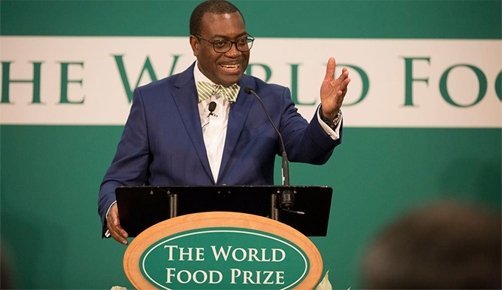AfDB launches pilot programme to cultivate the savannah in 8 African countries
October 19, 20172K views0 comments
The African Development Bank (AfDB) has launched a pilot programme to cultivate the savannah in eight African countries.
Akinwunmi Adesina, president of the African Development Bank, disclosed this Wednesday at the 2017 World Food Prize-Borlaug Dialogue symposium in Des Moines, Iowa United States.
According to Adesina, the potential of African savannahs is so huge that the World Bank called the Guinea savanna zone “one of the major underutilised resources in Africa.

“The savannahs of Africa cover a mind-boggling 600 million hectares, of which 400 million hectares are cultivable, Adesina said, regretting that just 10% of it is cultivated, a mere 40 million hectares.
Read Also:
Adesina, who spoke at a session titled “Transformation of the African Savannah Initiative noted that Africa’s savannahs were better than the savannahs of Brazil, a country notable for turning its savannahs into agricultural wealth, saying Africa’s soils were not acidic and therefore did not need liming which had to be done at massive scales in Brazil.
“The initiative will start by bringing approximately two million hectares of savannah in eight African countries — Ghana, Guinea, Democratic Republic of Congo, Central African Republic, Uganda, Kenya, Zambia, and Mozambique under the cultivation of maize, soybean, and livestock production in optimum conditions with a goal to double production in those eight countries.
“Africa must learn from the experiences that have worked elsewhere, while tailoring the interventions to the specific realities of Africa. We must ensure that small, medium-scale and large-scale commercial farmers co-exist in a way that allows opportunities for all,” Adesina said.
The 2017 World Food Prize Laureate explained that partnerships in research and development would be crucial, saying that was why the AfDB had engaged to work with the strongest possible organisations with proven track records in tropical agriculture from South America.
Some of them, he said, included the Brazilian Research Corporation (EMBRAPA), the Agricultural Corporation of Brazil (CAMPO), as well as others with long experience in conservation agriculture, including the Argentine Association of Zero-tillage (AAPRESID), and the Argentine Agricultural Research Institute.
“They will work very closely with universities and the national agricultural research systems across the savannahs of Africa,” he noted.
Jennifer Blanke, AfDB vice-president of Agriculture, human and social development, also explained that the Bank was determined to increase productivity so that Africa would become a net producer and exporter of agricultural produce.
“The idea is to have more job creation and create the next generation of agripreneurs. We can’t do everything. So, we’ve broken it down to certain number of value chains that we are going to tackle in Africa.
“If you look at the savannah, it has massive potential. In fact, it spans about 400 million hectares and only about 10% of it is utilised. It covers about 25 countries and about 240 million people are depending on agriculture in these areas and about half of them are living in poverty,” Blanke said.
The AfDB Vice-President highlighted that the savanna initiative, which begins in November, will use the best technology in order to transform the savanna based on the experience of Brazil.
Alysson Paulinelli, former minister of agriculture of Brazil, chairman of CAMPO and 1996 World Food Prize Laureate, in his address, noted that in the 1970s, Brazil was suffering a lot, like Africa today.
“We imported two-thirds of what we consumed. Brazilian families had to use about 42% of net income to feed themselves. We had to decide how to save Brazil. It was doomed to bankruptcy.
“So, we made a decision to drive a change in agriculture. The first thing we did was to realise that Brazilian agriculture was not different from colder climates. Brazil, the way things were, could not be self-sufficient, so we had to change our production system.
“The government needed to change first, but the Government was not ready. So, we put together a group of experts and they convinced the Government. After the Government, the farmers had to change and we believed it would benefit them,” he noted
Today, Brazil exports US $100 billion in food items, Paulinelli said, explaining
that the feat was not that difficult, saying that those who want innovation must believe in the benefit of science.
“Now, we are reaching Africa. And, on the request of the AfDB, we will start work in Ghana,” he said, adding that “the support from Japan was crucial to our success. Those who were doing the work in the fields received all the information from the institutions.”
